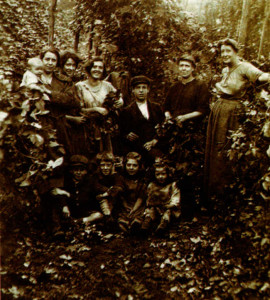
Although I now live in Kent, I was born and bred in London, at the Elephant & Castle. My grandmother lived with us, and would tell me about the hop-picking just after the First World War.
It seems there was a cheap hoppers’ train that left at midnight and arrived at Maidstone in the early hours of the morning. Maidstone then was quite a small county town, and there was a long walk of about five miles to the farms. Most of the hoppers walked en-masse lugging baggage and with large families, and would carry candles to help them find their way, arriving at the farms a couple of hours later and settling into their hopping huts, which were very basic with straw mattresses. People lived very much as John Clancy described in your September/October issue.
I was born in 1926, and although the family didn’t go hopping for a few years, an aunt married and moved to Maidstone. This was a golden opportunity for ‘painless hop-picking’ and I was about nine when I first went. Feeling posh, my mother told me to tell my teacher that I was going to the “hop gardens” as it sounded better than “going hopping”.
I remember well getting up at six on cold, misty mornings – it would just be getting light – and walking the mile to
the farm. I remember the smoky smell as the pickers made little fires and hung their billy cans to make lovely cups of smoky tea, but it seemed to taste like nectar.
Mother tried her utmost to make me pick. Opening an umbrella she’d sit me along the row and tell me to fill it, and I’d get a halfpenny. Later, a man would come round with a tray of sweets on his head, and walk round the field shouting: “Lolly! Lolly!”
At the end of the day the farm foreman would call: “Pull no more bines” – which meant everybody rushing to pull that last bine. A man would then come round to weigh the picked hops, everyone trying to get matey with him hoping that he’d take a lighter measure, which of course he didn’t.
Our hands would get rough and taste bitter.
At the finish mum and gran would give my aunt some money for having us stay, then it was back to London, happy and a little richer.
Violet Simpson








